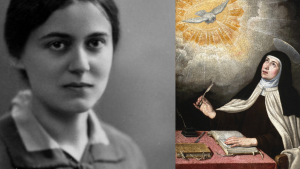What does it mean to be a woman? This question is so simple, but seems incredibly difficult to answer in today’s world.
When explaining something as profound as womanhood, I find it helpful to look at the writings of the saints and other Catholic thinkers.
While exploring this topic, I really enjoyed this fascinating podcast episode, “Edith Stein and the Gestalt of the Feminine Soul,” by Professor Catherine Pakaluk.
Dr. Pakaluk explains the thinking of brilliant philosopher St. Edith Stein (also known by her religious name, St. Teresa Benedicta of the Cross) on what it means to be a woman.
St. Teresa Benedicta believed that men and women share a universal human nature as rational beings ordered toward excellence and created to know, love, and serve God.
She also understood that men and women, while equal in dignity and purpose, really are not the same!
She wrote quite a lot about what makes women distinct. Famously, she wrote, “The woman’s soul is fashioned as a shelter in which other souls may unfold.”
St. Teresa Benedicta taught at a girls’ school for many years, giving her ample opportunities to study women’s education at close range. (Could you imagine having her for your teacher?! Those lucky students!)
As one of the most brilliant minds of her era, and a very holy woman, St. Teresa Benedicta used her genius to think through the conditions for a woman’s intellectual and spiritual flourishing.
She describes the following qualities as capturing the feminine soul’s essence, or gestalt.
- Open and expansive, to and for others
- Quiet and calm, so others aren’t extinguished
- Warm, so not to imperil fragile lives
- Clear, so nothing dark can hide in it
- Self-contained, meaning having a healthy and prudent reserve
- Empty of itself (or in modern words, “not narcissistic”), so others can have room in it and rest in it
- Mistress of itself (in modern words, having “self-mastery”), meaning having the discipline to be self-sufficient and independent
The wisdom of Edith Stein
I had a few questions about these definitions, so I turned to my friend Dr. Marcella Linn, a lecturer of philosophy at Loyola University Chicago.
She had sent me the podcast episode originally, and I was eager for her thoughts on St. Teresa Benedicta’s work. Here is our conversation.
Why is it helpful for women today to know what St. Edith Stein had to say about the gestalt of the feminine soul?
Linn: I think the value of looking at what Edith Stein says about the gestalt of the feminine soul comes from Edith Stein herself.
She was a brilliant philosopher and fervent Catholic. She lived a rich and varied life. She came from a devout Jewish home, but was later agnostic before her conversion to Catholicism.
She worked as a nurse before pursuing her doctorate degree under the still-renowned Edmund Husserl. She then worked as a teacher of young girls when she was refused a university position for being a woman (she was later denied a position for being Jewish). She finally entered the Carmelite order less than a decade before her execution at Auschwitz.
Her wide life experience and her observation of a variety of women and lifestyles made for deep insights into the nature of woman.
How would you explain this list of qualities from St. Teresa Benedicta? Are these qualities aspirational, something women should try to be like? Or is it more that these qualities fall on the feminine side of the emotional and mental spectrum?
Linn: First, I think it’s important to note that just before she introduces the gestalt of the feminine soul, Edith Stein explicitly states that she is bracketing individual differences, which may include having more masculine traits than the typical woman. She says, “Extensive individual differences [between particular women] shall not be denied; in many instances, women indicate predominantly masculine traits” (Fundamental Principles of Women’s Education, p. 132). So it’s possible to not see yourself in the ideal she presents for this reason.
Still, we ought to acknowledge that there would be very few women who could look at the ideal and say “yeah, that’s me 100%.” It’s an ideal after all — something we hope to attain rather than something that describes us. Treating it as such gives us a goal at which to aim, not a mirror through which our qualities are reflected.
Second, we can still ask the (very important) question about how to make progress towards the goal. In The Ethos of Women’s Professions, Edith Stein lists the common ways in which women err and gives suggestions for correction. She says that because of their natural, maternal posture, which values the “living, personal, and whole” (p. 45), women often make three mistakes.
The first mistake is focusing too much on themselves, which leads to vanity and gossip. The second mistake is yearning excessively for the whole so that they neglect the development of individual abilities in favor of “superficial nibbling in all areas” (p. 47). The third mistake is becoming absorbed in others to an extent that is unnecessary to aid in others’ development.
Edith Stein then suggests natural and supernatural remedies to these issues. One natural remedy is “solid objective work” since it involves repressing an excessively personal attitude (p. 48). The supernatural remedy is grace (p. 48), which gives rise to the need to be nourished by the holy sacraments (p. 56).
Stein says, “Whoever wants to preserve [the divine life] continually within herself must nourish it constantly from the source whence it flows without end – from the holy sacraments, above all from the sacrament of love. To have divine love as its inner form, a woman’s life must be a Eucharistic life. Only in daily, confidential relationship with the Lord in the tabernacle can one forget self, become free of all one’s own wishes and pretensions, and have a heart open to all the needs and wants of others” (p. 56).



